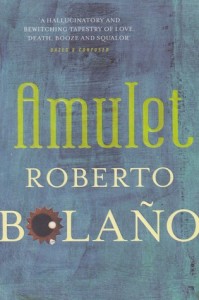The book Amulet was chosen from a hostel book exchange shelf after I realized that I was flying too quickly through my other book, and I would need something else to suffice the duration of the 15-hour bus ride ahead of me. I paid 20 Argentine pesos ($2USD) for it and opened it up to find that it is right up my alley.
This is the story of Auxilio Lacouture, a Uruguayan expat living in Mexico City in the 1960's. She is the self-proclaimed mother of Mexican poetry, taking odd jobs at the University's Faculty of Philosophy and Literature, working for old legendary poets, and nurturing the young minds and fresh ideas of Mexico City's newest intellectuals.
Bolaño's short novel is centered around one main event, the military coup known as the Tlateloco Massacre, which killed hundreds of student protestors. At the beginning of the attacks, Auxilio was alone in the fourth floor women's bathroom of the Faculty of Philosophy and Literature, and soon has reason to believe she is the only being left alive in the building. She spends the next two weeks holed-up in the fourth floor bathroom, and this reflective time produces the prose through which her life and love for the young poets of Mexico weaves in and out of the pages. The storytelling is psychedelic, or for lack of a better word "trippy", and although the book does not follow a traditional plot diagram, it kept me on the edge of my seat with the exciting flow of Mexico City life and the literary scene in the 1960's.
Auxilio reflects on her adventures: her arrival to Mexico City, her relationships with the poets and their families, and her strange encounters with the people that frequent themselves to the subculture she nurtures. It had small feminist undertones but succeeded at being a non-political novel in the midst of a very political and violent era. All throughout the book, I couldn't shake the idea of how strangely it reminded me of Ernest Hemingway's A Moveable Feast, a short biographical novel published after his death that recounts his relationships and wanderings while he was living as an expat in Paris in the 1920's, and his interactions with the writers around him that shaped his own life and work.
Overall it was a fascinating story for those like me who are often more interested in the writers themselves than their written works, or for anyone who has a keen interest in Latin American literature and politics. It was a great introduction to the work of Chilean writer Roberto Bolaño (whose alter ego plays a key part in this story), and I am very excited to read more from him!

